EDUCATION IN ANCIENT GREECE EDUCATION IN ANCIENT GREECE

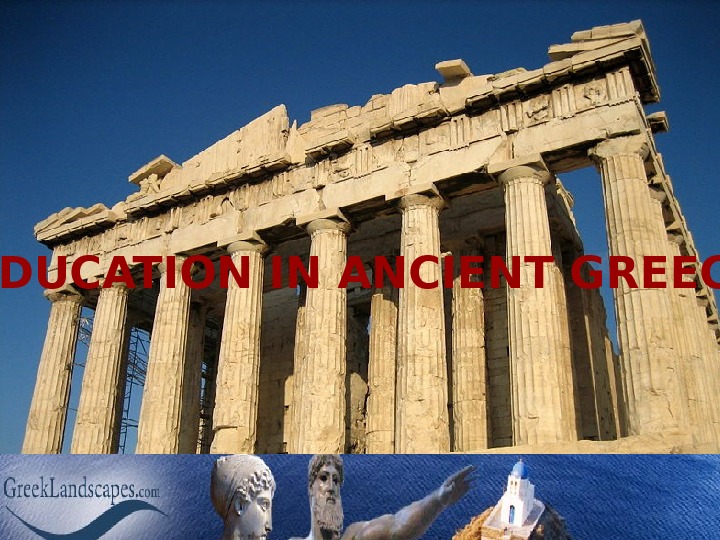
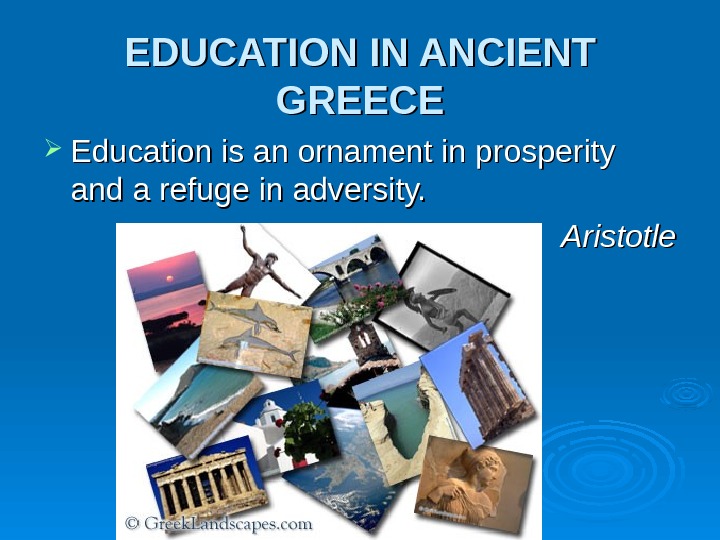

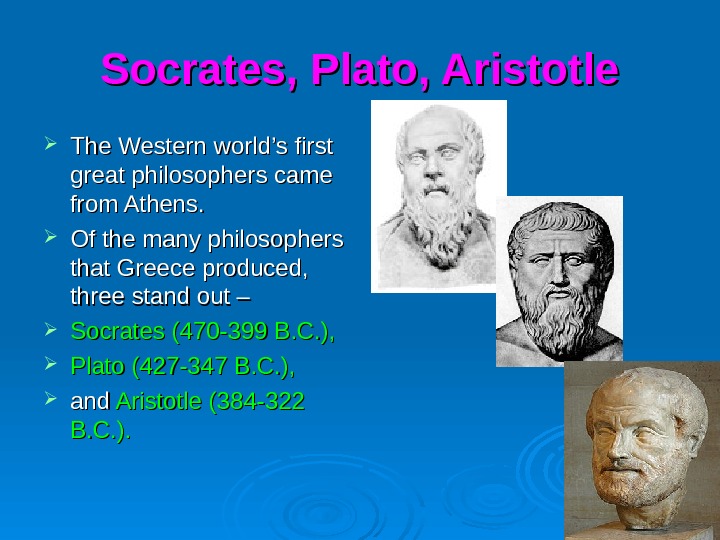
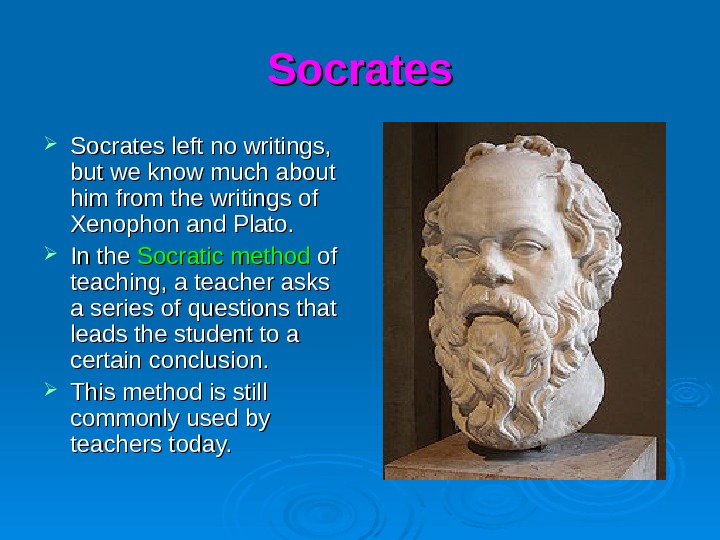
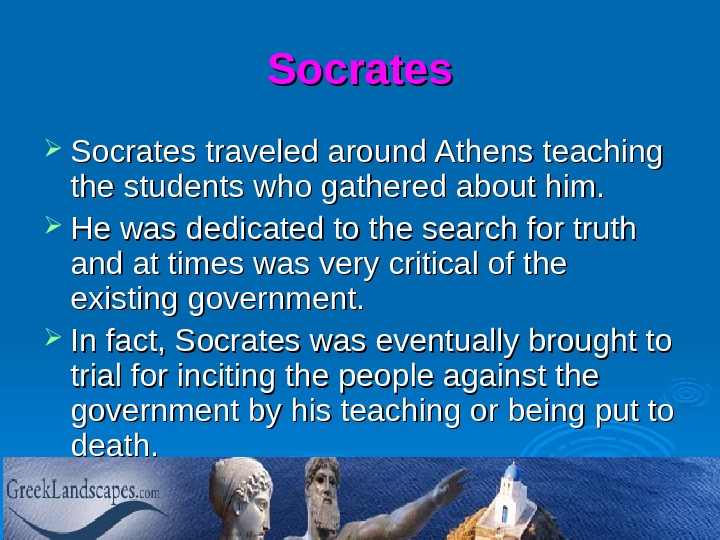
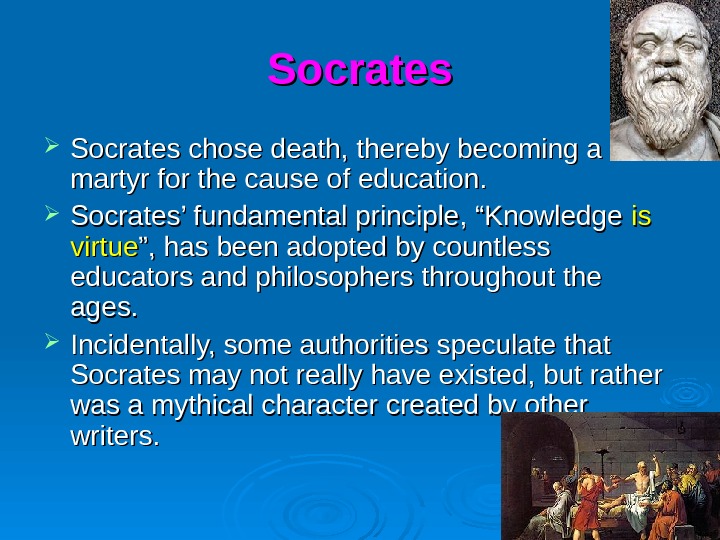
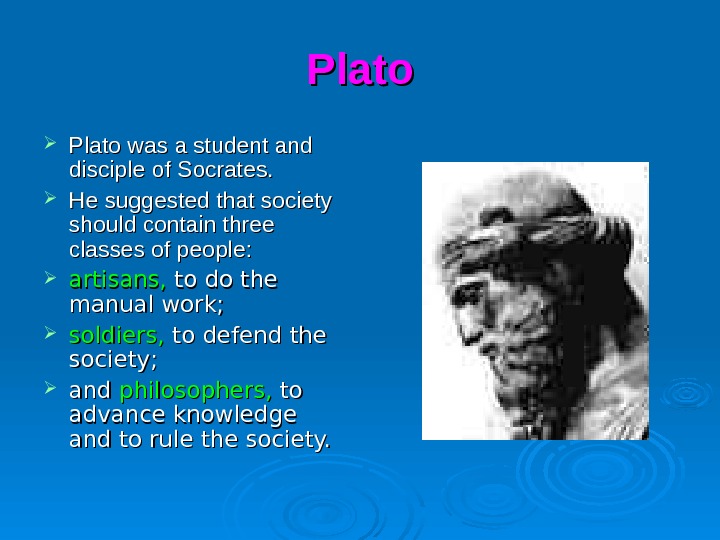
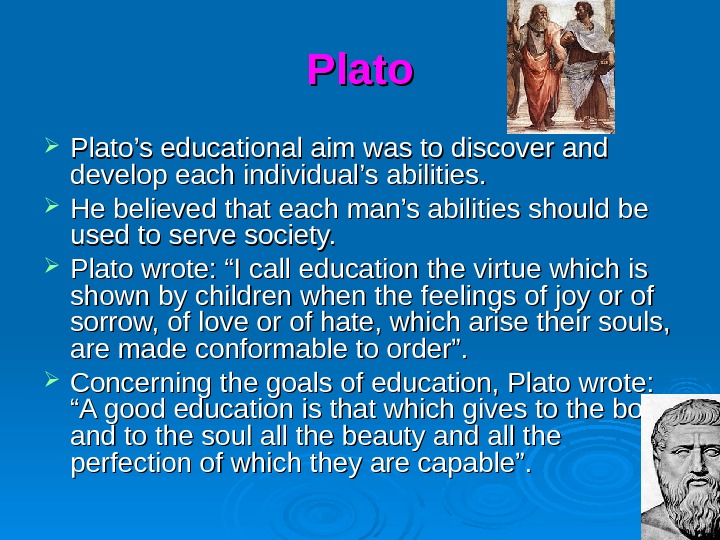
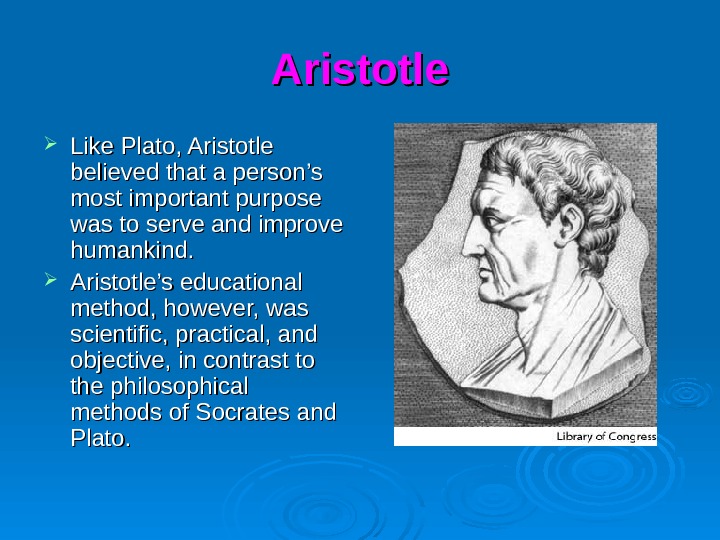
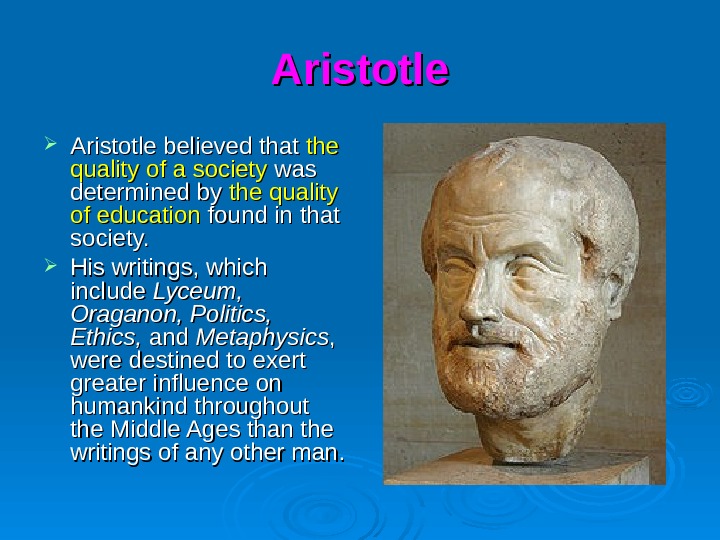
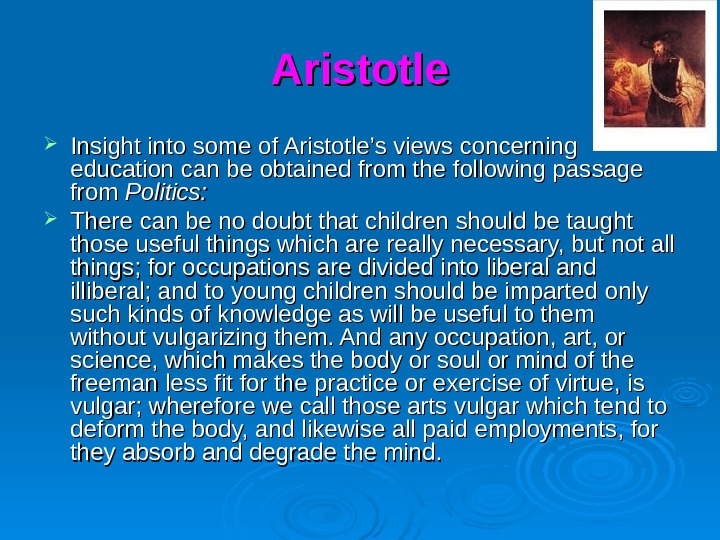
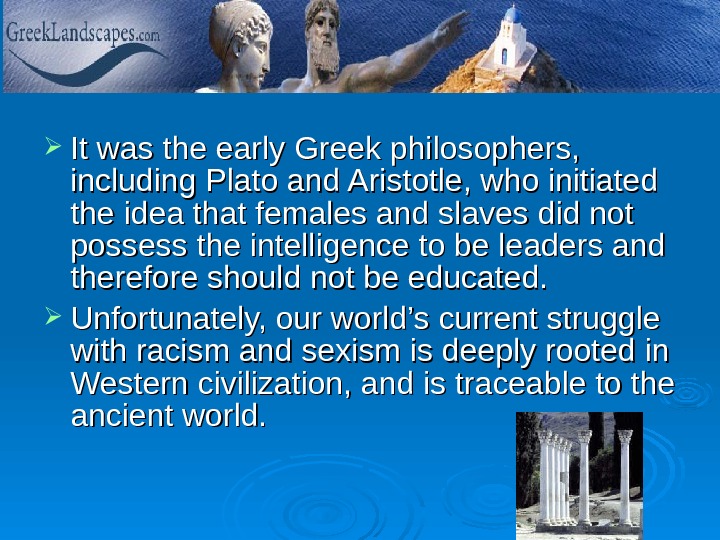
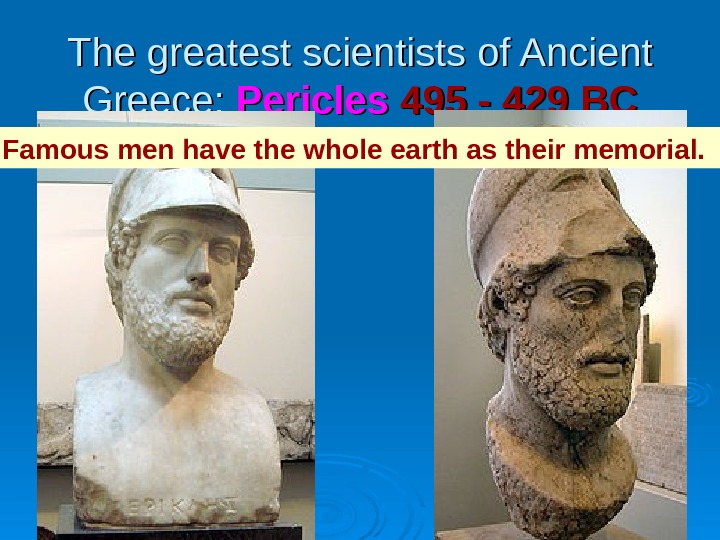
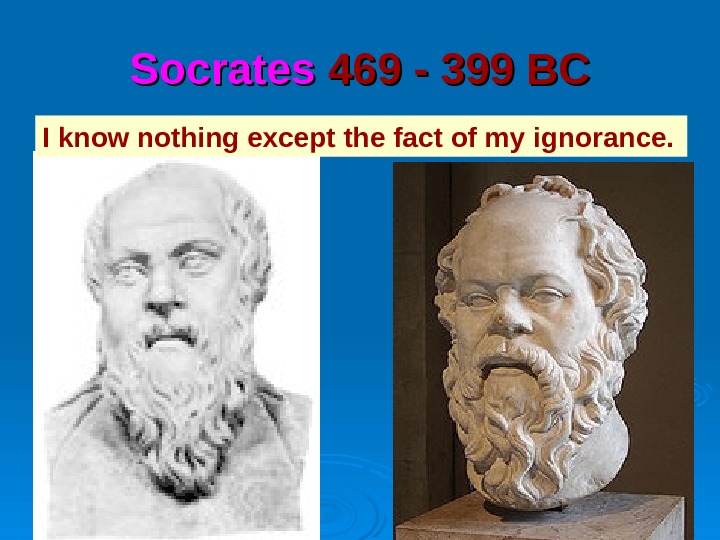
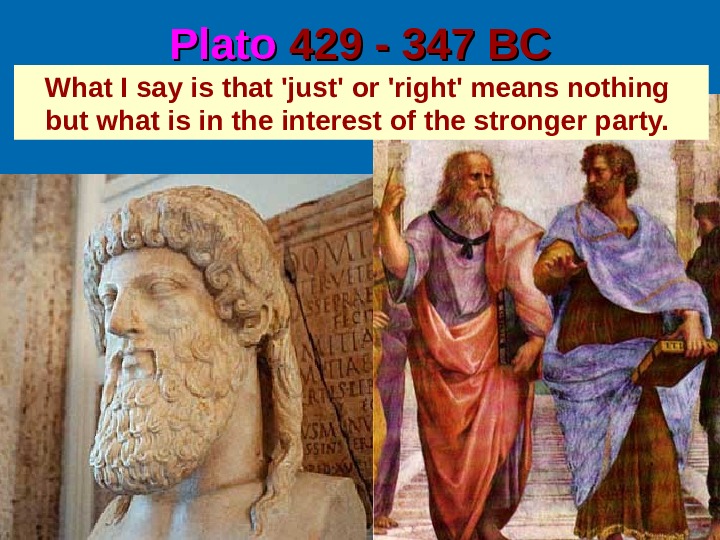
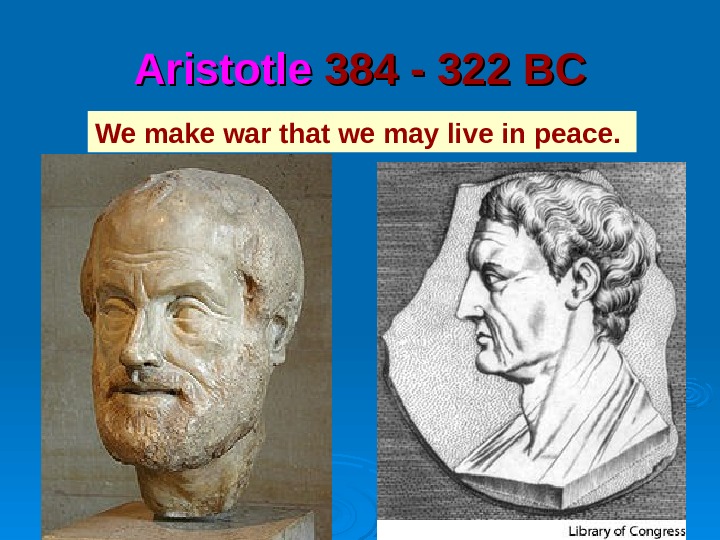
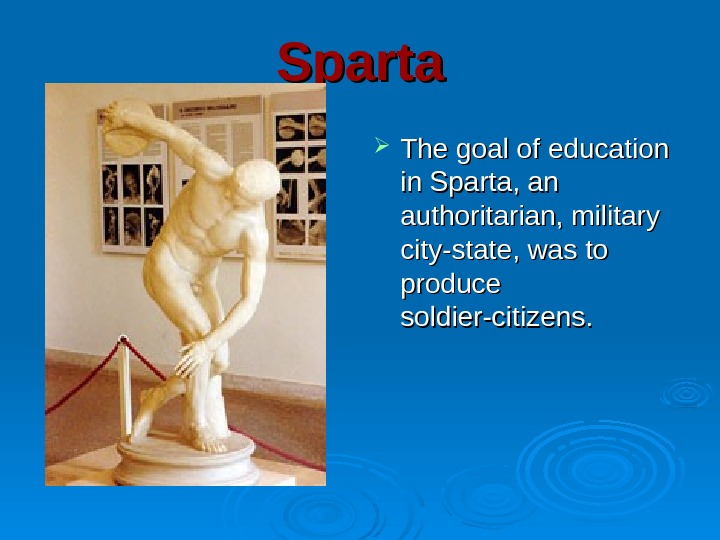
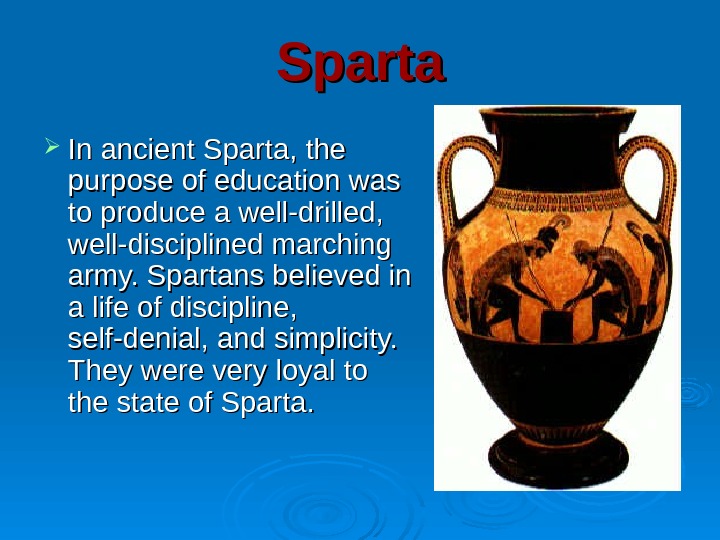
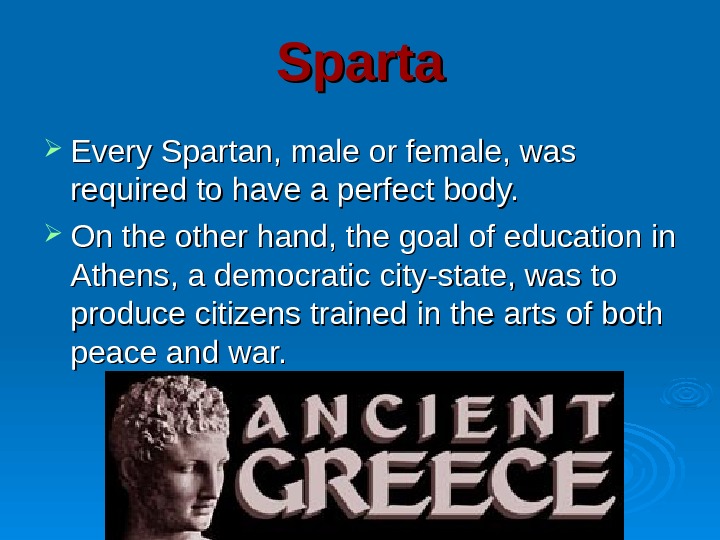
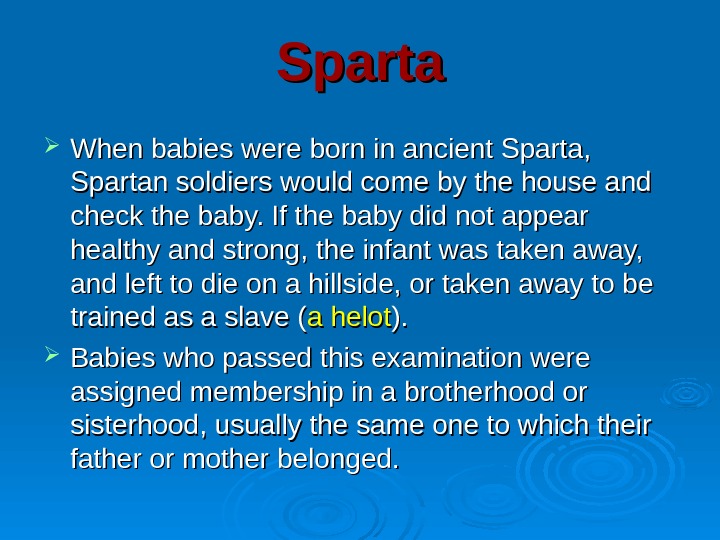
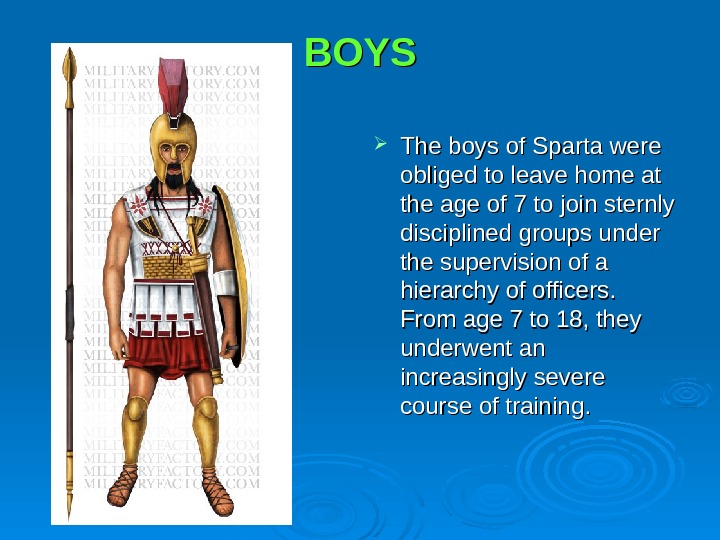
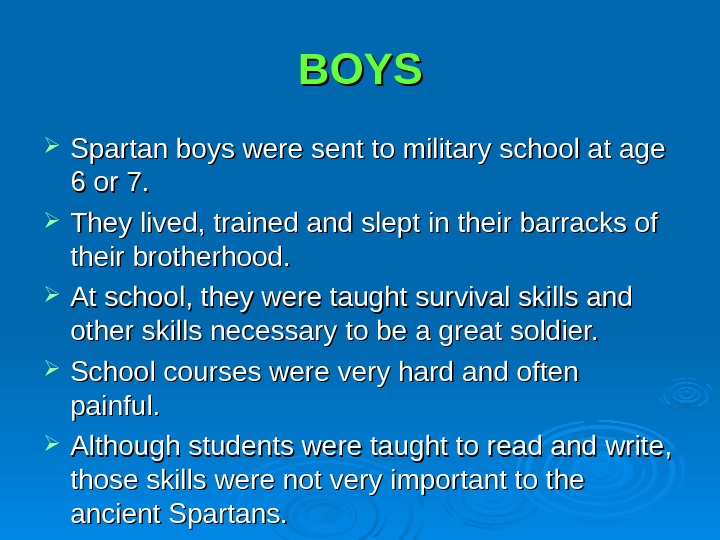
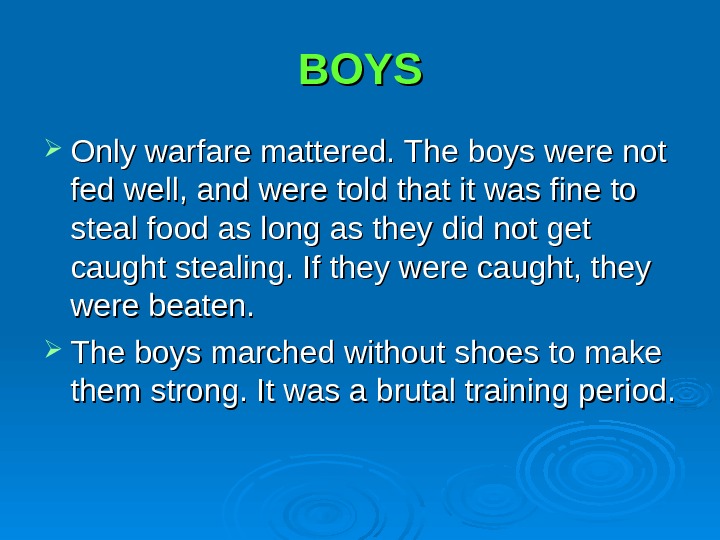
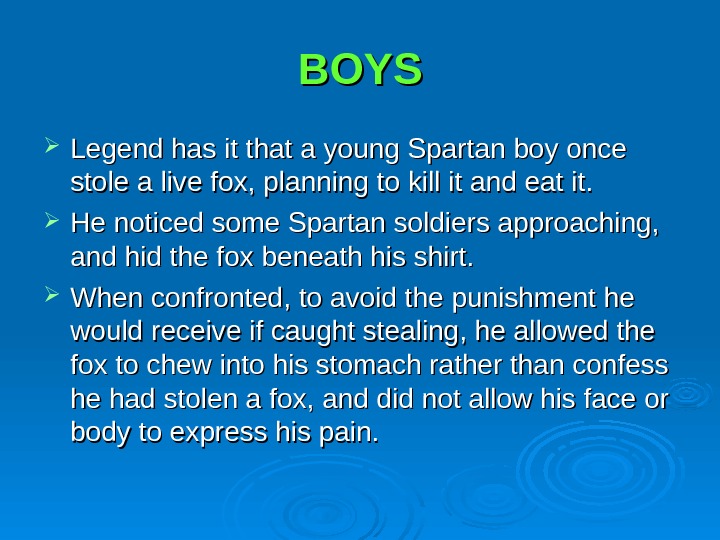
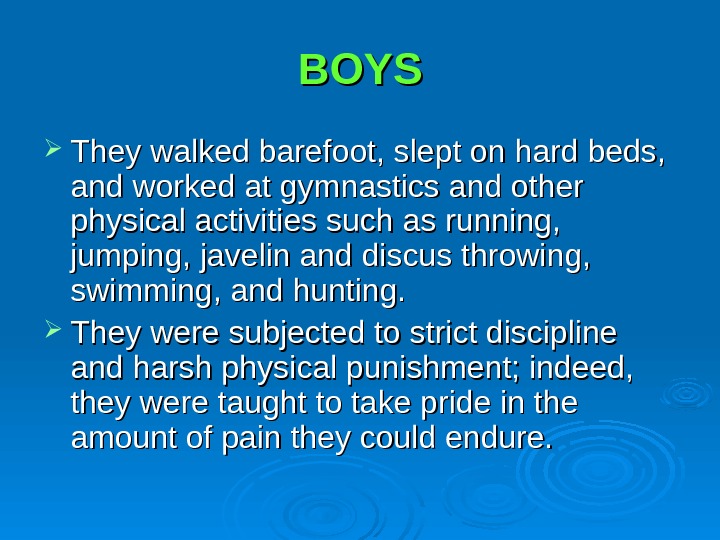
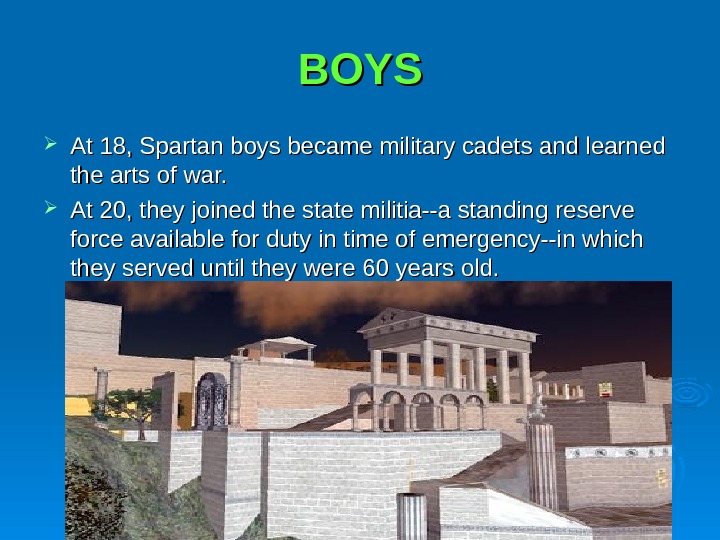
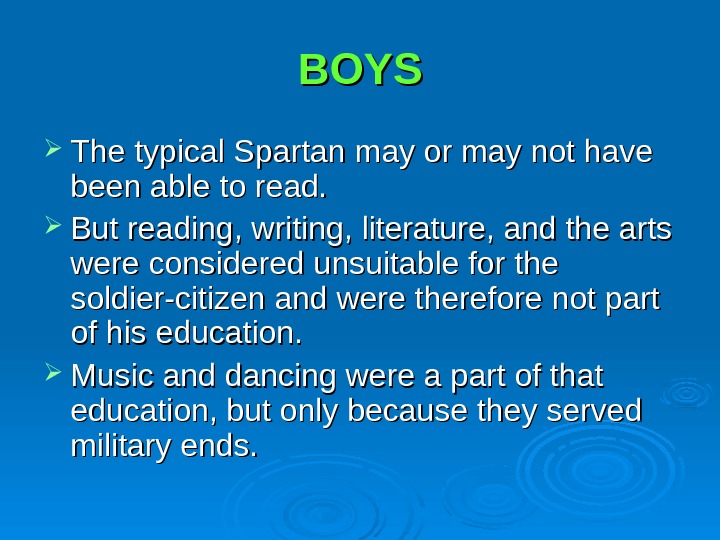
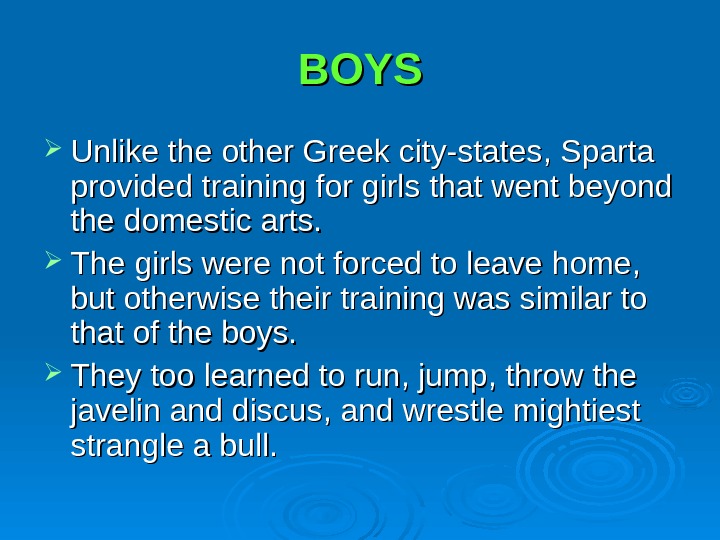
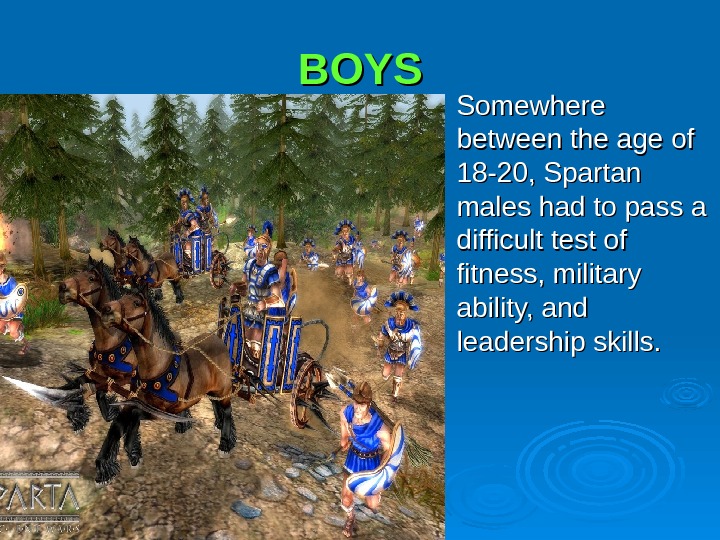
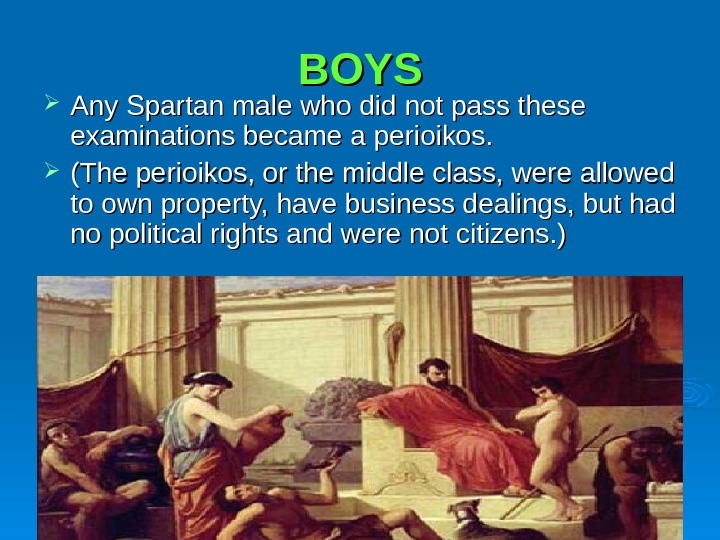
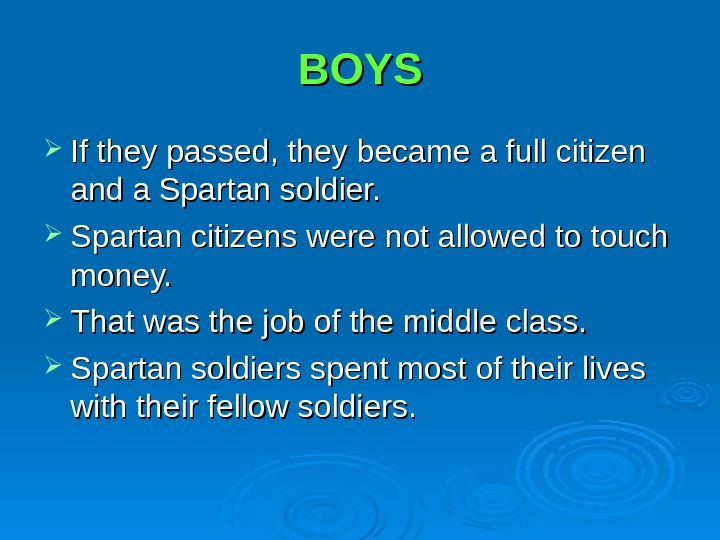
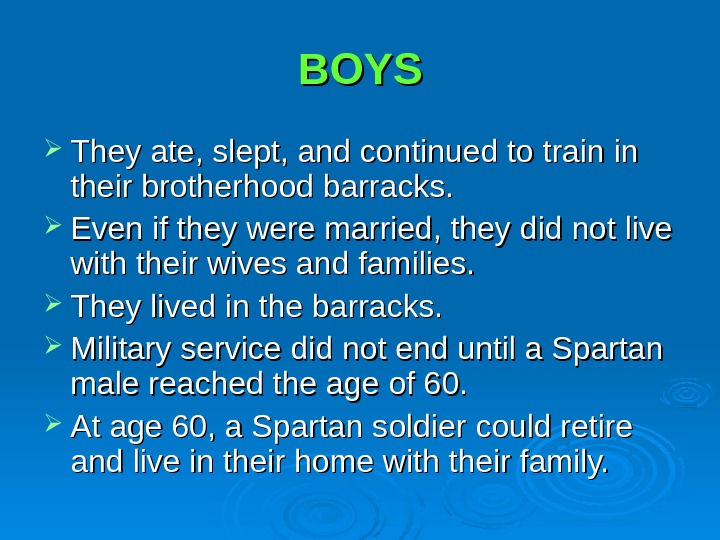
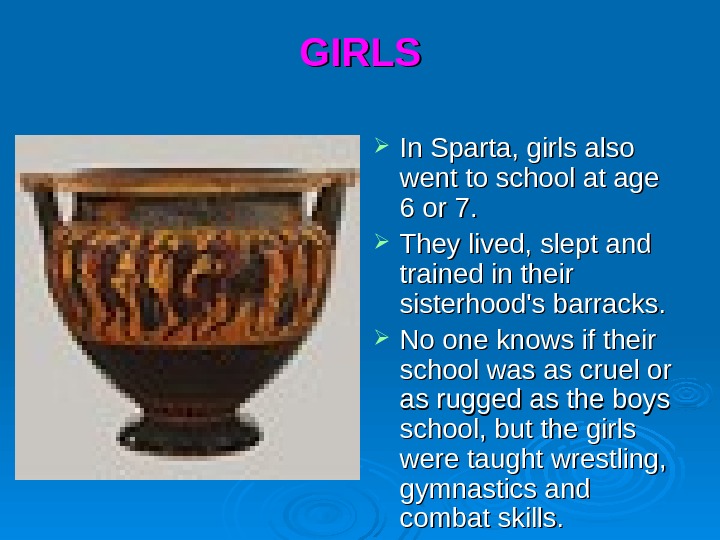
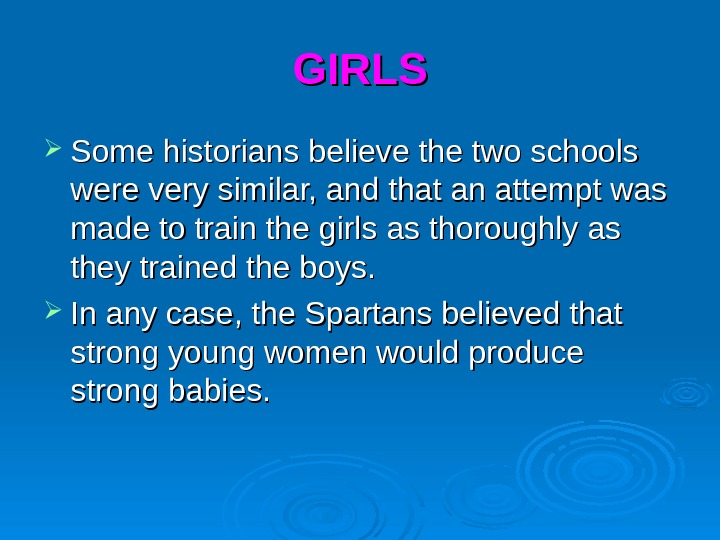
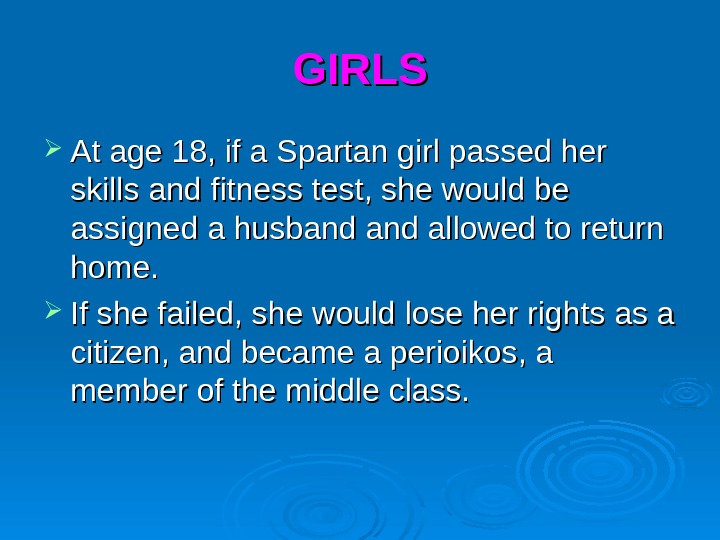
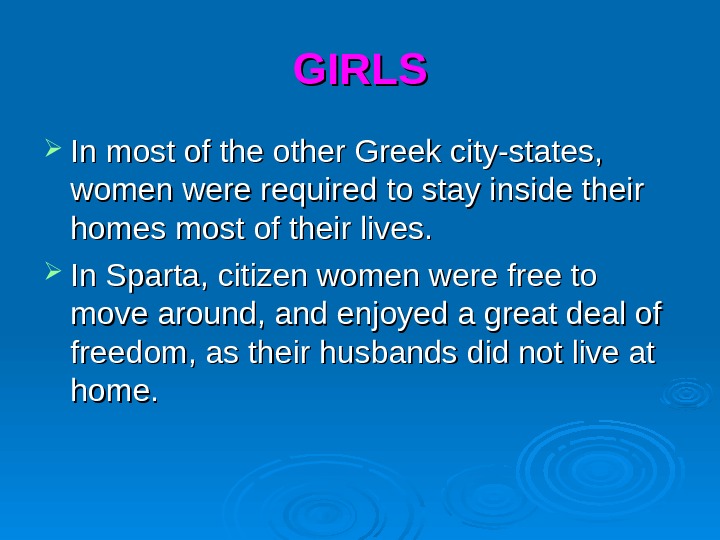
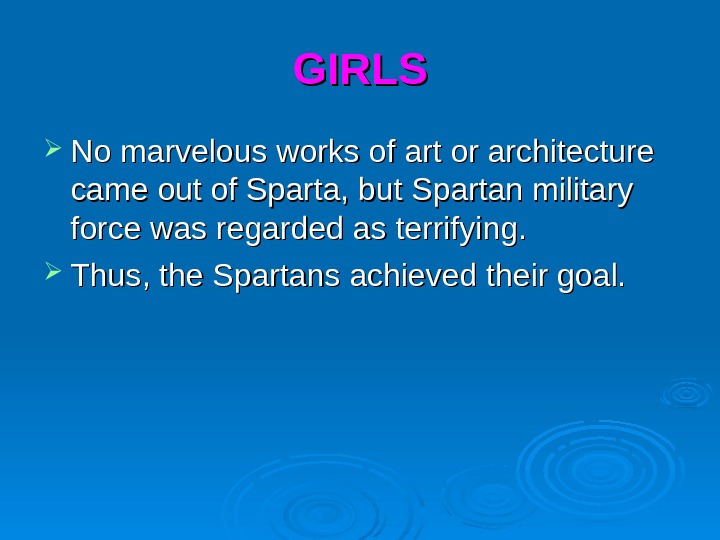
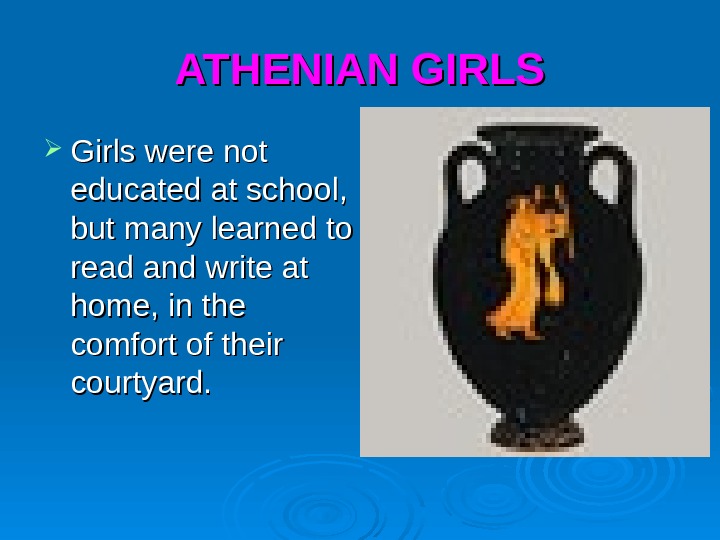
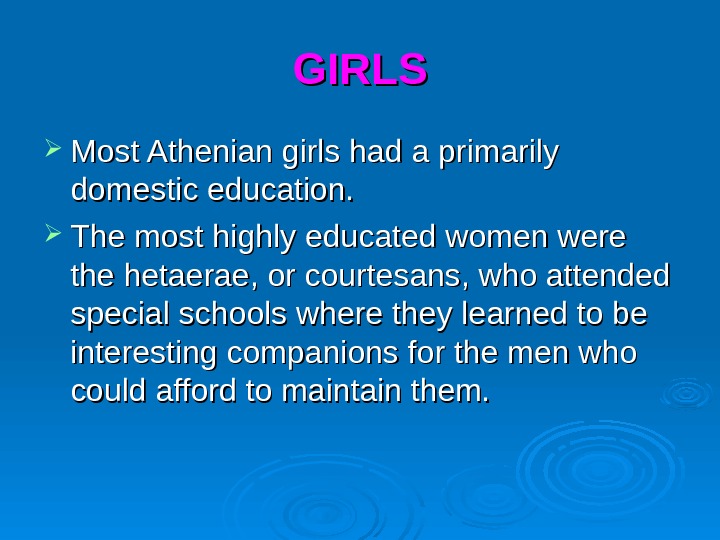
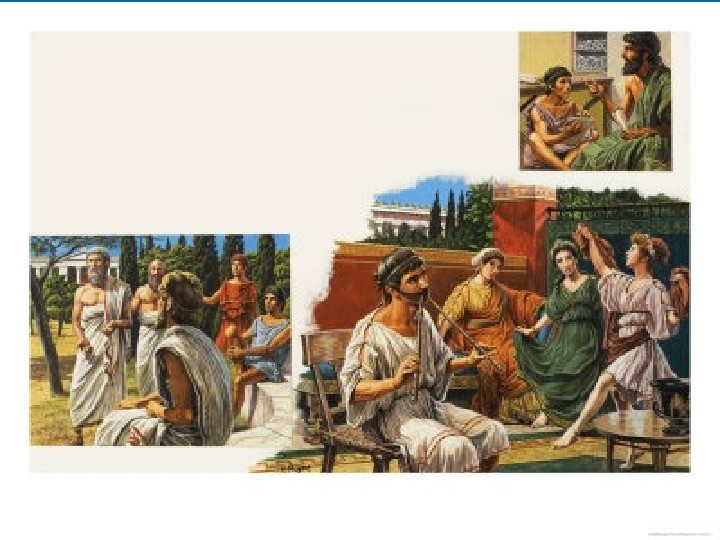
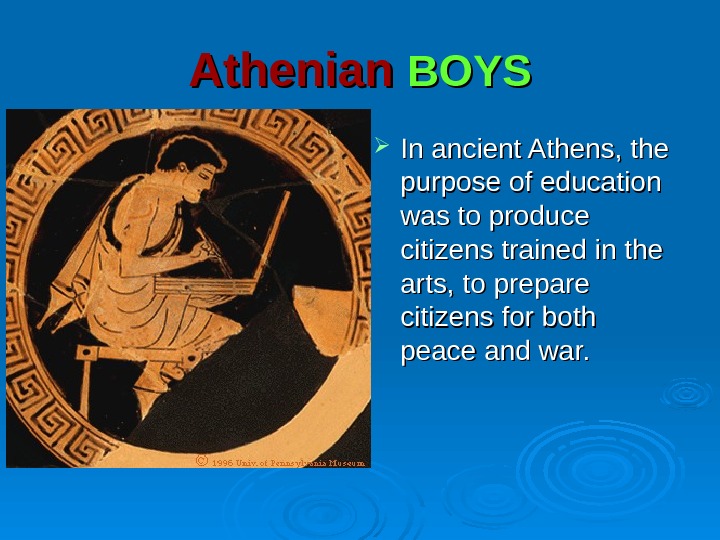
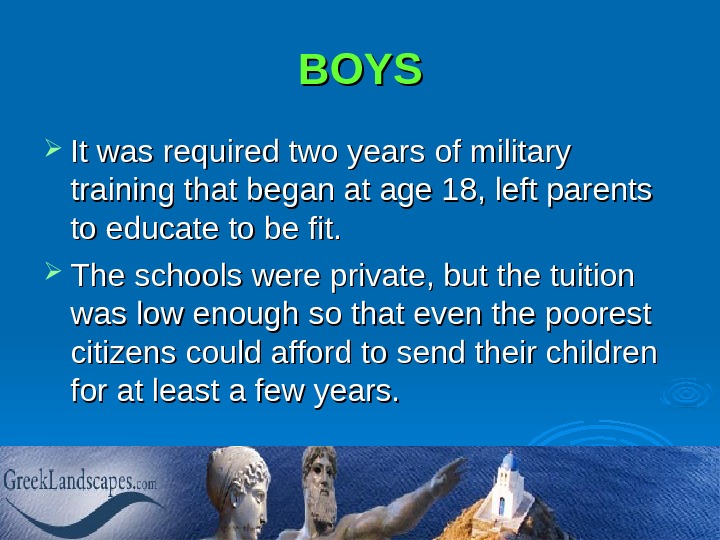
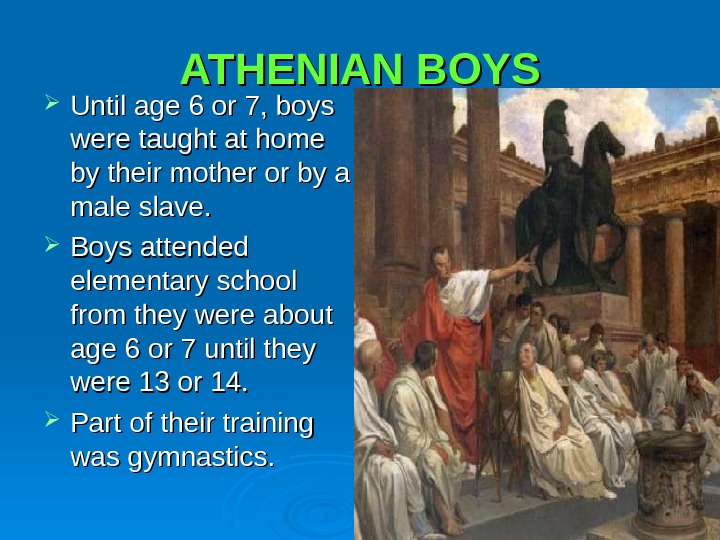
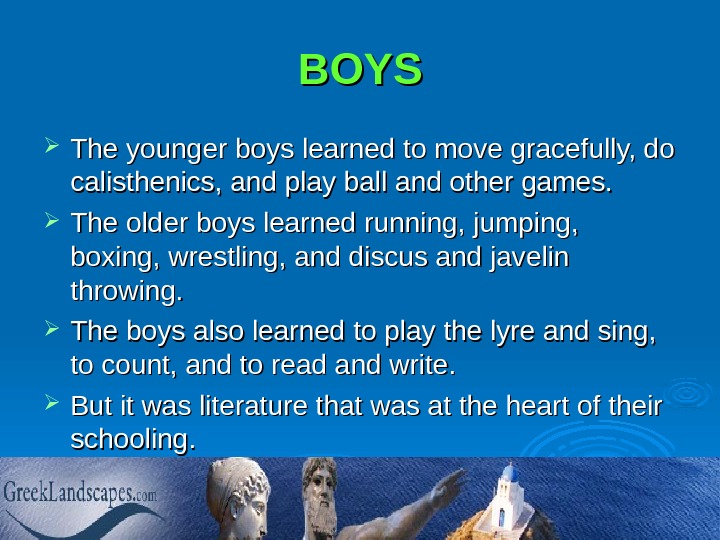
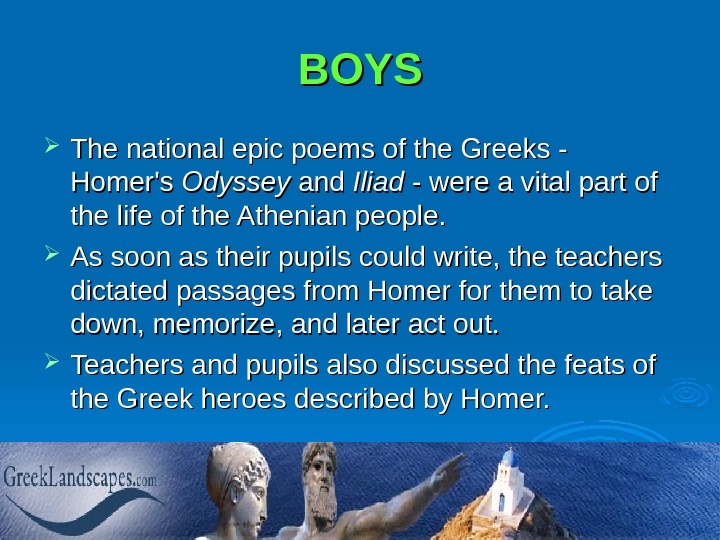
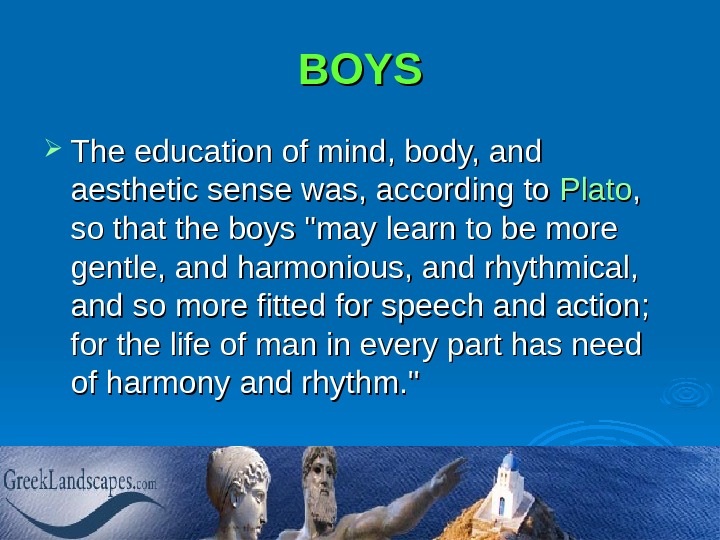
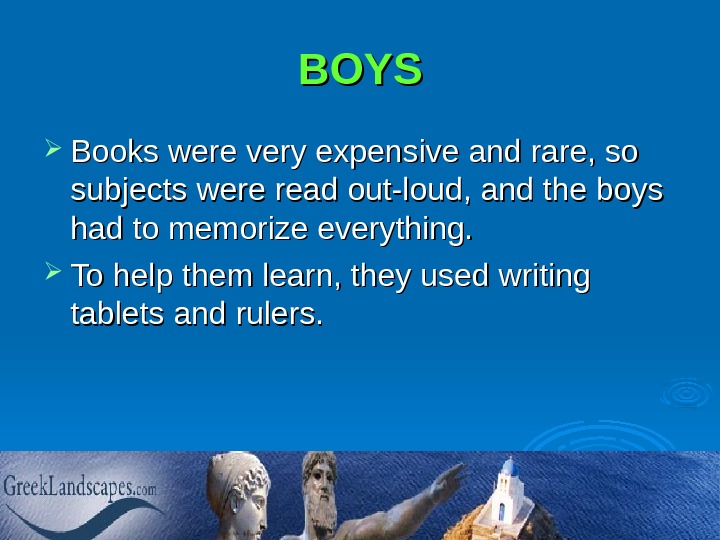
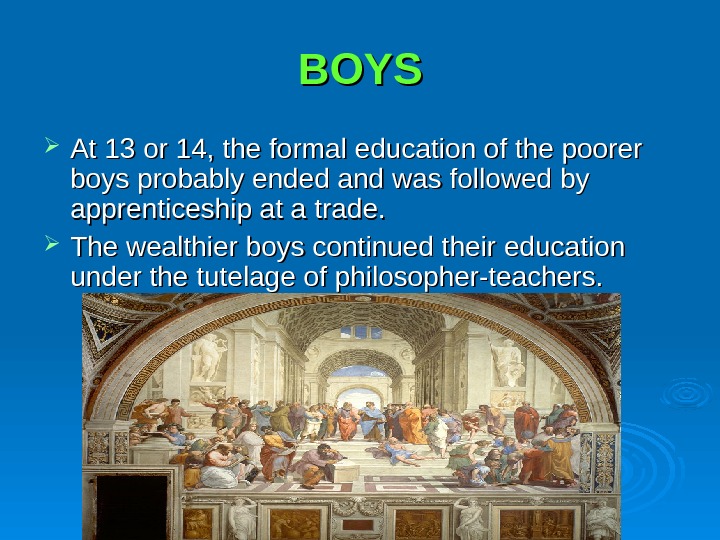
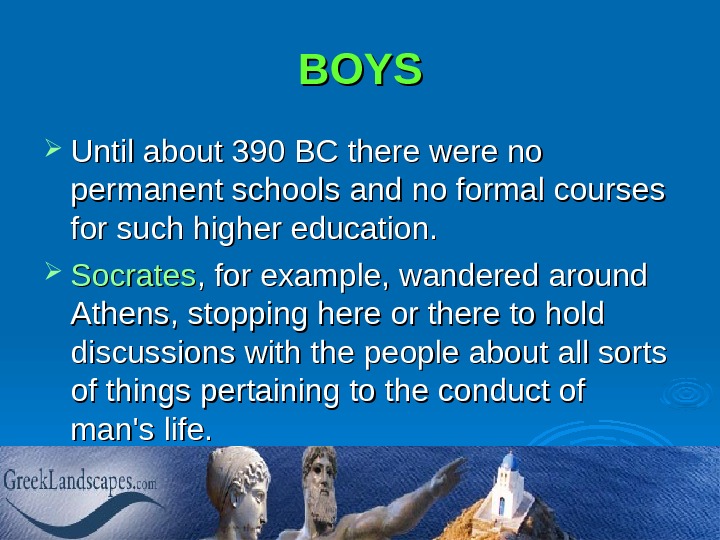
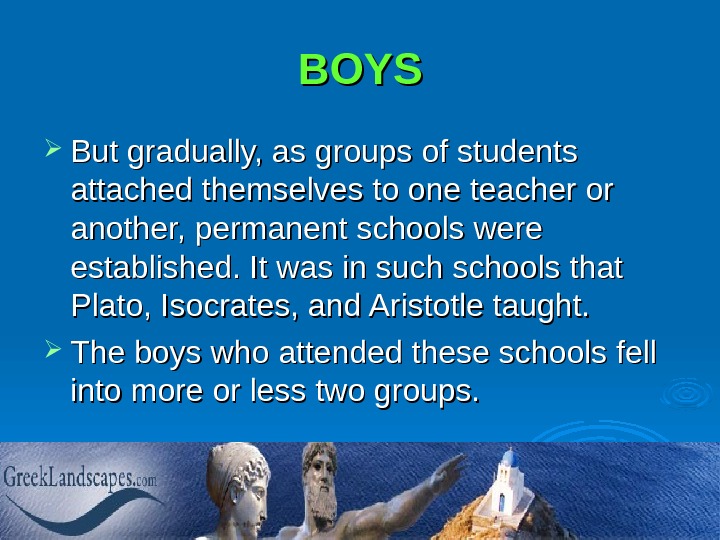
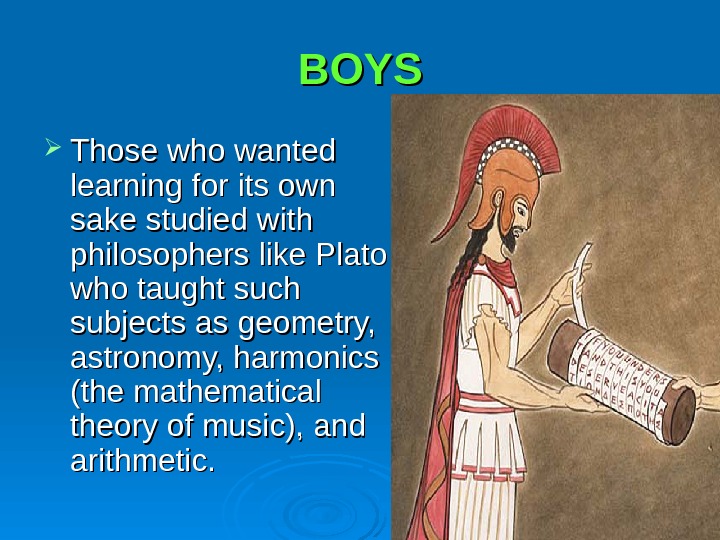
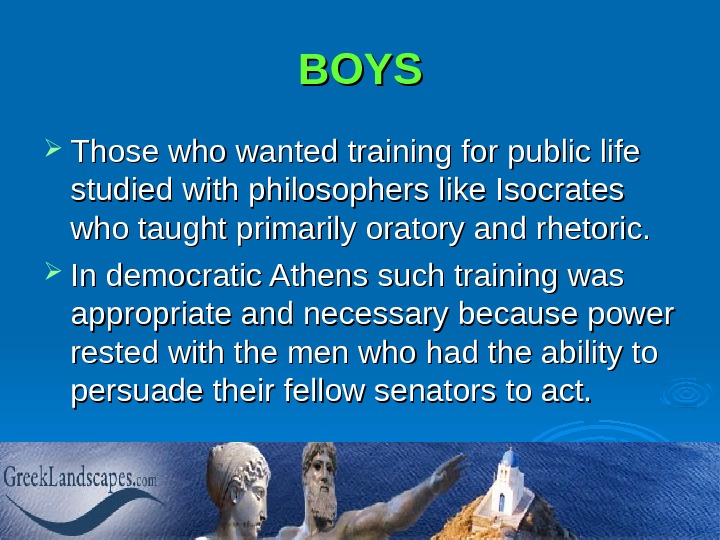
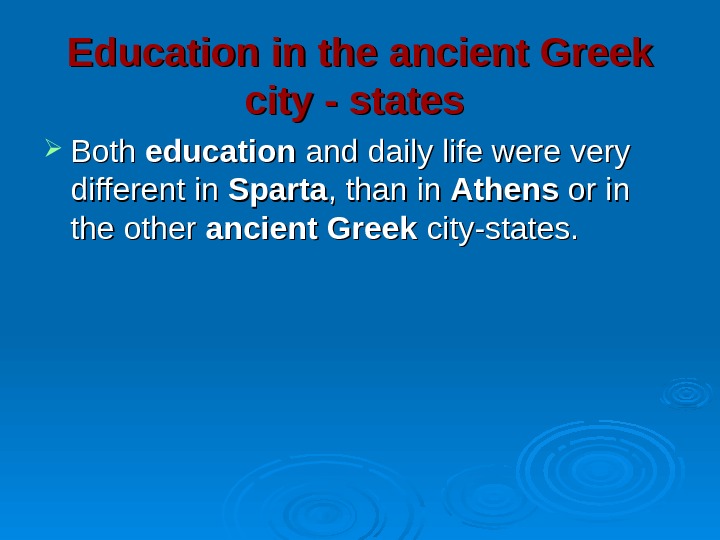
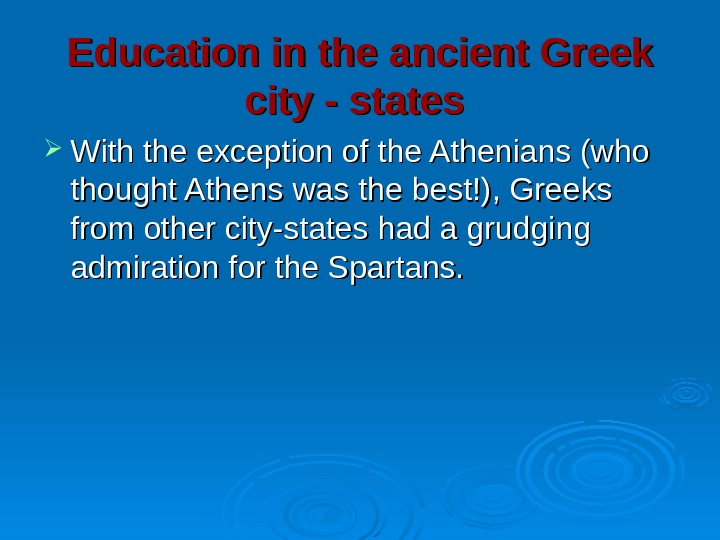
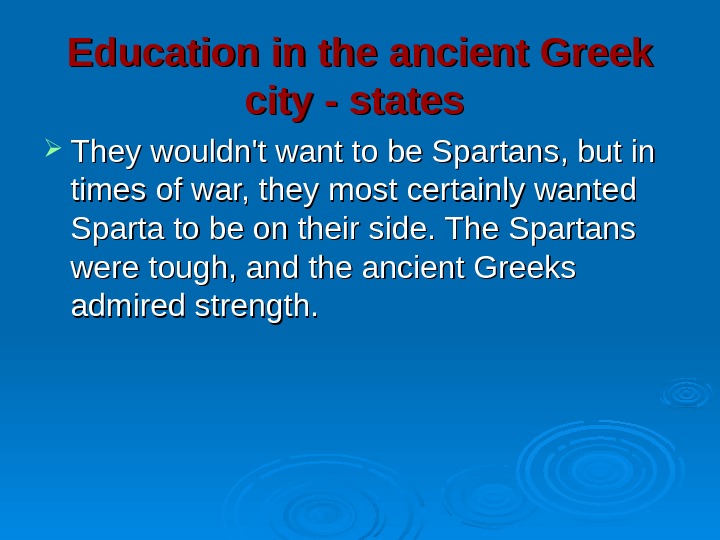







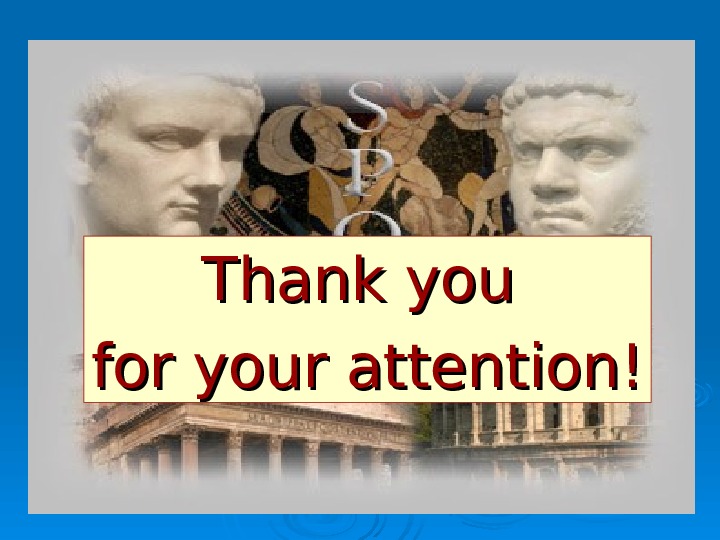
1education_in_ancient_greece.ppt
- Размер: 3.1 Mегабайта
- Количество слайдов: 64
Описание презентации EDUCATION IN ANCIENT GREECE EDUCATION IN ANCIENT GREECE по слайдам
 EDUCATION IN ANCIENT GR
EDUCATION IN ANCIENT GR
 EDUCATION IN ANCIENT GREECE Education is an ornament in prosperity and a refuge in adversity. Aristotle
EDUCATION IN ANCIENT GREECE Education is an ornament in prosperity and a refuge in adversity. Aristotle
 QUESTIONS OF SEMINAR 1. The greatest scientists of Ancient Greece: — Pericles — Socrates — Plato — Aristotle 2. The essence of Spartan and Athenian school system. 3. The major differences of Spartan and Athenian school system. 4. The reasons of existence these differences of Spartan and Athenian school system. 5. The role of education in modern society. The advantages of education.
QUESTIONS OF SEMINAR 1. The greatest scientists of Ancient Greece: — Pericles — Socrates — Plato — Aristotle 2. The essence of Spartan and Athenian school system. 3. The major differences of Spartan and Athenian school system. 4. The reasons of existence these differences of Spartan and Athenian school system. 5. The role of education in modern society. The advantages of education.
 Socrates, Plato, Aristotle The Western world’s first great philosophers came from Athens. Of the many philosophers that Greece produced, three stand out – Socrates (470 -399 B. C. ), Plato (427 -347 B. C. ), andand Aristotle (384 -322 B. C. ).
Socrates, Plato, Aristotle The Western world’s first great philosophers came from Athens. Of the many philosophers that Greece produced, three stand out – Socrates (470 -399 B. C. ), Plato (427 -347 B. C. ), andand Aristotle (384 -322 B. C. ).
 Socrates left no writings, but we know much about him from the writings of Xenophon and Plato. In the Socratic method of of teaching, a teacher asks a series of questions that leads the student to a certain conclusion. This method is still commonly used by teachers today.
Socrates left no writings, but we know much about him from the writings of Xenophon and Plato. In the Socratic method of of teaching, a teacher asks a series of questions that leads the student to a certain conclusion. This method is still commonly used by teachers today.
 Socrates traveled around Athens teaching the students who gathered about him. He was dedicated to the search for truth and at times was very critical of the existing government. In fact, Socrates was eventually brought to trial for inciting the people against the government by his teaching or being put to death.
Socrates traveled around Athens teaching the students who gathered about him. He was dedicated to the search for truth and at times was very critical of the existing government. In fact, Socrates was eventually brought to trial for inciting the people against the government by his teaching or being put to death.
 Socrates chose death, thereby becoming a martyr for the cause of education. Socrates’ fundamental principle, “Knowledge is is virtue ”, has been adopted by countless educators and philosophers throughout the ages. Incidentally, some authorities speculate that Socrates may not really have existed, but rather was a mythical character created by other writers.
Socrates chose death, thereby becoming a martyr for the cause of education. Socrates’ fundamental principle, “Knowledge is is virtue ”, has been adopted by countless educators and philosophers throughout the ages. Incidentally, some authorities speculate that Socrates may not really have existed, but rather was a mythical character created by other writers.
 Plato was a student and disciple of Socrates. He suggested that society should contain three classes of people: artisans, to do the manual work; soldiers, to defend the society; and philosophers, to to advance knowledge and to rule the society.
Plato was a student and disciple of Socrates. He suggested that society should contain three classes of people: artisans, to do the manual work; soldiers, to defend the society; and philosophers, to to advance knowledge and to rule the society.
 Plato’s educational aim was to discover and develop each individual’s abilities. He believed that each man’s abilities should be used to serve society. Plato wrote: “I call education the virtue which is shown by children when the feelings of joy or of sorrow, of love or of hate, which arise their souls, are made conformable to order”. Concerning the goals of education, Plato wrote: “A good education is that which gives to the body and to the soul all the beauty and all the perfection of which they are capable”.
Plato’s educational aim was to discover and develop each individual’s abilities. He believed that each man’s abilities should be used to serve society. Plato wrote: “I call education the virtue which is shown by children when the feelings of joy or of sorrow, of love or of hate, which arise their souls, are made conformable to order”. Concerning the goals of education, Plato wrote: “A good education is that which gives to the body and to the soul all the beauty and all the perfection of which they are capable”.
 Aristotle Like Plato, Aristotle believed that a person’s most important purpose was to serve and improve humankind. Aristotle’s educational method, however, was scientific, practical, and objective, in contrast to the philosophical methods of Socrates and Plato.
Aristotle Like Plato, Aristotle believed that a person’s most important purpose was to serve and improve humankind. Aristotle’s educational method, however, was scientific, practical, and objective, in contrast to the philosophical methods of Socrates and Plato.
 Aristotle believed that the quality of a society was determined by the quality of education found in that society. His writings, which include Lyceum, Oraganon, Politics, Ethics, and Metaphysics , , were destined to exert greater influence on humankind throughout the Middle Ages than the writings of any other man.
Aristotle believed that the quality of a society was determined by the quality of education found in that society. His writings, which include Lyceum, Oraganon, Politics, Ethics, and Metaphysics , , were destined to exert greater influence on humankind throughout the Middle Ages than the writings of any other man.
 Aristotle Insight into some of Aristotle’s views concerning education can be obtained from the following passage from Politics: There can be no doubt that children should be taught those useful things which are really necessary, but not all things; for occupations are divided into liberal and illiberal; and to young children should be imparted only such kinds of knowledge as will be useful to them without vulgarizing them. And any occupation, art, or science, which makes the body or soul or mind of the freeman less fit for the practice or exercise of virtue, is vulgar; wherefore we call those arts vulgar which tend to deform the body, and likewise all paid employments, for they absorb and degrade the mind.
Aristotle Insight into some of Aristotle’s views concerning education can be obtained from the following passage from Politics: There can be no doubt that children should be taught those useful things which are really necessary, but not all things; for occupations are divided into liberal and illiberal; and to young children should be imparted only such kinds of knowledge as will be useful to them without vulgarizing them. And any occupation, art, or science, which makes the body or soul or mind of the freeman less fit for the practice or exercise of virtue, is vulgar; wherefore we call those arts vulgar which tend to deform the body, and likewise all paid employments, for they absorb and degrade the mind.
 It was the early Greek philosophers, including Plato and Aristotle, who initiated the idea that females and slaves did not possess the intelligence to be leaders and therefore should not be educated. Unfortunately, our world’s current struggle with racism and sexism is deeply rooted in Western civilization, and is traceable to the ancient world.
It was the early Greek philosophers, including Plato and Aristotle, who initiated the idea that females and slaves did not possess the intelligence to be leaders and therefore should not be educated. Unfortunately, our world’s current struggle with racism and sexism is deeply rooted in Western civilization, and is traceable to the ancient world.
 The greatest scientists of Ancient Greece: Pericles 495 — 429 BC Famous men have the whole earth as their memorial.
The greatest scientists of Ancient Greece: Pericles 495 — 429 BC Famous men have the whole earth as their memorial.
 Socrates 469 — 399 BC I know nothing except the fact of my ignorance.
Socrates 469 — 399 BC I know nothing except the fact of my ignorance.
 Plato 429 — 347 BC What I say is that ‘just’ or ‘right’ means nothing but what is in the interest of the stronger party.
Plato 429 — 347 BC What I say is that ‘just’ or ‘right’ means nothing but what is in the interest of the stronger party.
 Aristotle 384 — 322 BC We make war that we may live in peace.
Aristotle 384 — 322 BC We make war that we may live in peace.
 Sparta The goal of education in Sparta, an authoritarian, military city-state, was to produce soldier-citizens.
Sparta The goal of education in Sparta, an authoritarian, military city-state, was to produce soldier-citizens.
 Sparta In ancient Sparta, the purpose of education was to produce a well-drilled, well-disciplined marching army. Spartans believed in a life of discipline, self-denial, and simplicity. They were very loyal to the state of Sparta.
Sparta In ancient Sparta, the purpose of education was to produce a well-drilled, well-disciplined marching army. Spartans believed in a life of discipline, self-denial, and simplicity. They were very loyal to the state of Sparta.
 Sparta Every Spartan, male or female, was required to have a perfect body. On the other hand, the goal of education in Athens, a democratic city-state, was to produce citizens trained in the arts of both peace and war.
Sparta Every Spartan, male or female, was required to have a perfect body. On the other hand, the goal of education in Athens, a democratic city-state, was to produce citizens trained in the arts of both peace and war.
 Sparta When babies were born in ancient Sparta, Spartan soldiers would come by the house and check the baby. If the baby did not appear healthy and strong, the infant was taken away, and left to die on a hillside, or taken away to be trained as a slave ( a helot ). ). Babies who passed this examination were assigned membership in a brotherhood or sisterhood, usually the same one to which their father or mother belonged.
Sparta When babies were born in ancient Sparta, Spartan soldiers would come by the house and check the baby. If the baby did not appear healthy and strong, the infant was taken away, and left to die on a hillside, or taken away to be trained as a slave ( a helot ). ). Babies who passed this examination were assigned membership in a brotherhood or sisterhood, usually the same one to which their father or mother belonged.
 BOYS The boys of Sparta were obliged to leave home at the age of 7 to join sternly disciplined groups under the supervision of a hierarchy of officers. From age 7 to 18, they underwent an increasingly severe course of training.
BOYS The boys of Sparta were obliged to leave home at the age of 7 to join sternly disciplined groups under the supervision of a hierarchy of officers. From age 7 to 18, they underwent an increasingly severe course of training.
 BOYS Spartan boys were sent to military school at age 6 or 7. They lived, trained and slept in their barracks of their brotherhood. At school, they were taught survival skills and other skills necessary to be a great soldier. School courses were very hard and often painful. Although students were taught to read and write, those skills were not very important to the ancient Spartans.
BOYS Spartan boys were sent to military school at age 6 or 7. They lived, trained and slept in their barracks of their brotherhood. At school, they were taught survival skills and other skills necessary to be a great soldier. School courses were very hard and often painful. Although students were taught to read and write, those skills were not very important to the ancient Spartans.
 BOYS Only warfare mattered. The boys were not fed well, and were told that it was fine to steal food as long as they did not get caught stealing. If they were caught, they were beaten. The boys marched without shoes to make them strong. It was a brutal training period.
BOYS Only warfare mattered. The boys were not fed well, and were told that it was fine to steal food as long as they did not get caught stealing. If they were caught, they were beaten. The boys marched without shoes to make them strong. It was a brutal training period.
 BOYS Legend has it that a young Spartan boy once stole a live fox, planning to kill it and eat it. He noticed some Spartan soldiers approaching, and hid the fox beneath his shirt. When confronted, to avoid the punishment he would receive if caught stealing, he allowed the fox to chew into his stomach rather than confess he had stolen a fox, and did not allow his face or body to express his pain.
BOYS Legend has it that a young Spartan boy once stole a live fox, planning to kill it and eat it. He noticed some Spartan soldiers approaching, and hid the fox beneath his shirt. When confronted, to avoid the punishment he would receive if caught stealing, he allowed the fox to chew into his stomach rather than confess he had stolen a fox, and did not allow his face or body to express his pain.
 BOYS They walked barefoot, slept on hard beds, and worked at gymnastics and other physical activities such as running, jumping, javelin and discus throwing, swimming, and hunting. They were subjected to strict discipline and harsh physical punishment; indeed, they were taught to take pride in the amount of pain they could endure.
BOYS They walked barefoot, slept on hard beds, and worked at gymnastics and other physical activities such as running, jumping, javelin and discus throwing, swimming, and hunting. They were subjected to strict discipline and harsh physical punishment; indeed, they were taught to take pride in the amount of pain they could endure.
 BOYS At 18, Spartan boys became military cadets and learned the arts of war. At 20, they joined the state militia—a standing reserve force available for duty in time of emergency—in which they served until they were 60 years old.
BOYS At 18, Spartan boys became military cadets and learned the arts of war. At 20, they joined the state militia—a standing reserve force available for duty in time of emergency—in which they served until they were 60 years old.
 BOYS The typical Spartan may or may not have been able to read. But reading, writing, literature, and the arts were considered unsuitable for the soldier-citizen and were therefore not part of his education. Music and dancing were a part of that education, but only because they served military ends.
BOYS The typical Spartan may or may not have been able to read. But reading, writing, literature, and the arts were considered unsuitable for the soldier-citizen and were therefore not part of his education. Music and dancing were a part of that education, but only because they served military ends.
 BOYS Unlike the other Greek city-states, Sparta provided training for girls that went beyond the domestic arts. The girls were not forced to leave home, but otherwise their training was similar to that of the boys. They too learned to run, jump, throw the javelin and discus, and wrestle mightiest strangle a bull.
BOYS Unlike the other Greek city-states, Sparta provided training for girls that went beyond the domestic arts. The girls were not forced to leave home, but otherwise their training was similar to that of the boys. They too learned to run, jump, throw the javelin and discus, and wrestle mightiest strangle a bull.
 BOYS Somewhere between the age of 18 -20, Spartan males had to pass a difficult test of fitness, military ability, and leadership skills.
BOYS Somewhere between the age of 18 -20, Spartan males had to pass a difficult test of fitness, military ability, and leadership skills.
 BOYS Any Spartan male who did not pass these examinations became a perioikos. (The perioikos, or the middle class, were allowed to own property, have business dealings, but had no political rights and were not citizens. )
BOYS Any Spartan male who did not pass these examinations became a perioikos. (The perioikos, or the middle class, were allowed to own property, have business dealings, but had no political rights and were not citizens. )
 BOYS If they passed, they became a full citizen and a Spartan soldier. Spartan citizens were not allowed to touch money. That was the job of the middle class. Spartan soldiers spent most of their lives with their fellow soldiers.
BOYS If they passed, they became a full citizen and a Spartan soldier. Spartan citizens were not allowed to touch money. That was the job of the middle class. Spartan soldiers spent most of their lives with their fellow soldiers.
 BOYS They ate, slept, and continued to train in their brotherhood barracks. Even if they were married, they did not live with their wives and families. They lived in the barracks. Military service did not end until a Spartan male reached the age of 60. At age 60, a Spartan soldier could retire and live in their home with their family.
BOYS They ate, slept, and continued to train in their brotherhood barracks. Even if they were married, they did not live with their wives and families. They lived in the barracks. Military service did not end until a Spartan male reached the age of 60. At age 60, a Spartan soldier could retire and live in their home with their family.
 GIRLS In Sparta, girls also went to school at age 6 or 7. They lived, slept and trained in their sisterhood’s barracks. No one knows if their school was as cruel or as rugged as the boys school, but the girls were taught wrestling, gymnastics and combat skills.
GIRLS In Sparta, girls also went to school at age 6 or 7. They lived, slept and trained in their sisterhood’s barracks. No one knows if their school was as cruel or as rugged as the boys school, but the girls were taught wrestling, gymnastics and combat skills.
 GIRLS Some historians believe the two schools were very similar, and that an attempt was made to train the girls as thoroughly as they trained the boys. In any case, the Spartans believed that strong young women would produce strong babies.
GIRLS Some historians believe the two schools were very similar, and that an attempt was made to train the girls as thoroughly as they trained the boys. In any case, the Spartans believed that strong young women would produce strong babies.
 GIRLS At age 18, if a Spartan girl passed her skills and fitness test, she would be assigned a husband and allowed to return home. If she failed, she would lose her rights as a citizen, and became a perioikos, a member of the middle class.
GIRLS At age 18, if a Spartan girl passed her skills and fitness test, she would be assigned a husband and allowed to return home. If she failed, she would lose her rights as a citizen, and became a perioikos, a member of the middle class.
 GIRLS In most of the other Greek city-states, women were required to stay inside their homes most of their lives. In Sparta, citizen women were free to move around, and enjoyed a great deal of freedom, as their husbands did not live at home.
GIRLS In most of the other Greek city-states, women were required to stay inside their homes most of their lives. In Sparta, citizen women were free to move around, and enjoyed a great deal of freedom, as their husbands did not live at home.
 GIRLS No marvelous works of art or architecture came out of Sparta, but Spartan military force was regarded as terrifying. Thus, the Spartans achieved their goal.
GIRLS No marvelous works of art or architecture came out of Sparta, but Spartan military force was regarded as terrifying. Thus, the Spartans achieved their goal.
 ATHENIAN GIRLS Girls were not educated at school, but many learned to read and write at home, in the comfort of their courtyard.
ATHENIAN GIRLS Girls were not educated at school, but many learned to read and write at home, in the comfort of their courtyard.
 GIRLS Most Athenian girls had a primarily domestic education. The most highly educated women were the hetaerae, or courtesans, who attended special schools where they learned to be interesting companions for the men who could afford to maintain them.
GIRLS Most Athenian girls had a primarily domestic education. The most highly educated women were the hetaerae, or courtesans, who attended special schools where they learned to be interesting companions for the men who could afford to maintain them.

 Athenian BOYS In ancient Athens, the purpose of education was to produce citizens trained in the arts, to prepare citizens for both peace and war.
Athenian BOYS In ancient Athens, the purpose of education was to produce citizens trained in the arts, to prepare citizens for both peace and war.
 BOYS It was required two years of military training that began at age 18, left parents to educate to be fit. The schools were private, but the tuition was low enough so that even the poorest citizens could afford to send their children for at least a few years.
BOYS It was required two years of military training that began at age 18, left parents to educate to be fit. The schools were private, but the tuition was low enough so that even the poorest citizens could afford to send their children for at least a few years.
 ATHENIAN BOYS Until age 6 or 7, boys were taught at home by their mother or by a male slave. Boys attended elementary school from they were about age 6 or 7 until they were 13 or 14. Part of their training was gymnastics.
ATHENIAN BOYS Until age 6 or 7, boys were taught at home by their mother or by a male slave. Boys attended elementary school from they were about age 6 or 7 until they were 13 or 14. Part of their training was gymnastics.
 BOYS The younger boys learned to move gracefully, do calisthenics, and play ball and other games. The older boys learned running, jumping, boxing, wrestling, and discus and javelin throwing. The boys also learned to play the lyre and sing, to count, and to read and write. But it was literature that was at the heart of their schooling.
BOYS The younger boys learned to move gracefully, do calisthenics, and play ball and other games. The older boys learned running, jumping, boxing, wrestling, and discus and javelin throwing. The boys also learned to play the lyre and sing, to count, and to read and write. But it was literature that was at the heart of their schooling.
 BOYS The national epic poems of the Greeks — Homer’s Odyssey and Iliad — were a vital part of the life of the Athenian people. As soon as their pupils could write, the teachers dictated passages from Homer for them to take down, memorize, and later act out. Teachers and pupils also discussed the feats of the Greek heroes described by Homer.
BOYS The national epic poems of the Greeks — Homer’s Odyssey and Iliad — were a vital part of the life of the Athenian people. As soon as their pupils could write, the teachers dictated passages from Homer for them to take down, memorize, and later act out. Teachers and pupils also discussed the feats of the Greek heroes described by Homer.
 BOYS The education of mind, body, and aesthetic sense was, according to Plato , , so that the boys «may learn to be more gentle, and harmonious, and rhythmical, and so more fitted for speech and action; for the life of man in every part has need of harmony and rhythm. «
BOYS The education of mind, body, and aesthetic sense was, according to Plato , , so that the boys «may learn to be more gentle, and harmonious, and rhythmical, and so more fitted for speech and action; for the life of man in every part has need of harmony and rhythm. «
 BOYS Books were very expensive and rare, so subjects were read out-loud, and the boys had to memorize everything. To help them learn, they used writing tablets and rulers.
BOYS Books were very expensive and rare, so subjects were read out-loud, and the boys had to memorize everything. To help them learn, they used writing tablets and rulers.
 BOYS At 13 or 14, the formal education of the poorer boys probably ended and was followed by apprenticeship at a trade. The wealthier boys continued their education under the tutelage of philosopher-teachers.
BOYS At 13 or 14, the formal education of the poorer boys probably ended and was followed by apprenticeship at a trade. The wealthier boys continued their education under the tutelage of philosopher-teachers.
 BOYS Until about 390 BC there were no permanent schools and no formal courses for such higher education. Socrates , for example, wandered around Athens, stopping here or there to hold discussions with the people about all sorts of things pertaining to the conduct of man’s life.
BOYS Until about 390 BC there were no permanent schools and no formal courses for such higher education. Socrates , for example, wandered around Athens, stopping here or there to hold discussions with the people about all sorts of things pertaining to the conduct of man’s life.
 BOYS But gradually, as groups of students attached themselves to one teacher or another, permanent schools were established. It was in such schools that Plato, Isocrates, and Aristotle taught. The boys who attended these schools fell into more or less two groups.
BOYS But gradually, as groups of students attached themselves to one teacher or another, permanent schools were established. It was in such schools that Plato, Isocrates, and Aristotle taught. The boys who attended these schools fell into more or less two groups.
 BOYS Those who wanted learning for its own sake studied with philosophers like Plato who taught such subjects as geometry, astronomy, harmonics (the mathematical theory of music), and arithmetic.
BOYS Those who wanted learning for its own sake studied with philosophers like Plato who taught such subjects as geometry, astronomy, harmonics (the mathematical theory of music), and arithmetic.
 BOYS Those who wanted training for public life studied with philosophers like Isocrates who taught primarily oratory and rhetoric. In democratic Athens such training was appropriate and necessary because power rested with the men who had the ability to persuade their fellow senators to act.
BOYS Those who wanted training for public life studied with philosophers like Isocrates who taught primarily oratory and rhetoric. In democratic Athens such training was appropriate and necessary because power rested with the men who had the ability to persuade their fellow senators to act.
 Education in the ancient Greek city — states Both education and daily life were very different in Sparta , than in Athens or in the other ancient Greek city-states.
Education in the ancient Greek city — states Both education and daily life were very different in Sparta , than in Athens or in the other ancient Greek city-states.
 Education in the ancient Greek city — states With the exception of the Athenians (who thought Athens was the best!), Greeks from other city-states had a grudging admiration for the Spartans.
Education in the ancient Greek city — states With the exception of the Athenians (who thought Athens was the best!), Greeks from other city-states had a grudging admiration for the Spartans.
 Education in the ancient Greek city — states They wouldn’t want to be Spartans, but in times of war, they most certainly wanted Sparta to be on their side. The Spartans were tough, and the ancient Greeks admired strength.
Education in the ancient Greek city — states They wouldn’t want to be Spartans, but in times of war, they most certainly wanted Sparta to be on their side. The Spartans were tough, and the ancient Greeks admired strength.
 Conclusion Knowledge of languages – is communication and comfortable way of coexistence with all world. .
Conclusion Knowledge of languages – is communication and comfortable way of coexistence with all world. .
 Educated person – is communicative and successful person. .
Educated person – is communicative and successful person. .
 Successful development of science and technique is defined by high level of education in state. .
Successful development of science and technique is defined by high level of education in state. .
 Good education – is investment in economic well-being and stability of country. .
Good education – is investment in economic well-being and stability of country. .
 Education – is the source of stability and prosperity of each person in the world. .
Education – is the source of stability and prosperity of each person in the world. .
 Education – is developmental locomotive of civilization as a whole on the Earth. .
Education – is developmental locomotive of civilization as a whole on the Earth. .
 Conclusion To be able to be caught up into the world of thought — that is educated. Edith Hamilton Education: a debt due from present to future generations. George Peabody Education makes a people easy to lead, but difficult to drive; easy to govern, but impossible to enslave. Lord Brougham
Conclusion To be able to be caught up into the world of thought — that is educated. Edith Hamilton Education: a debt due from present to future generations. George Peabody Education makes a people easy to lead, but difficult to drive; easy to govern, but impossible to enslave. Lord Brougham
 Thank you for your attention!
Thank you for your attention!

